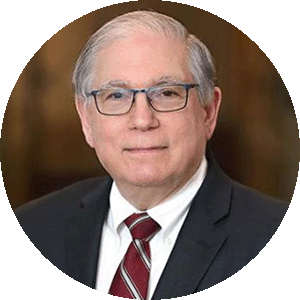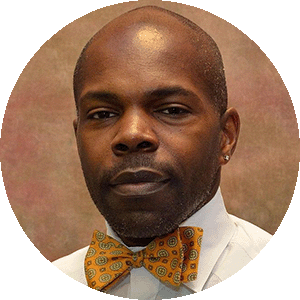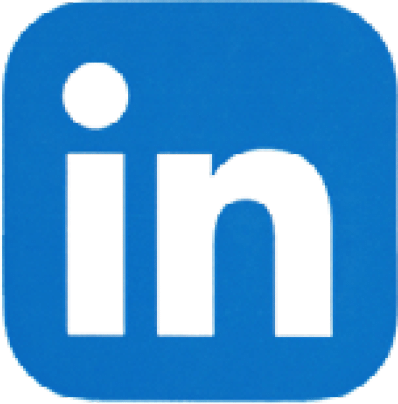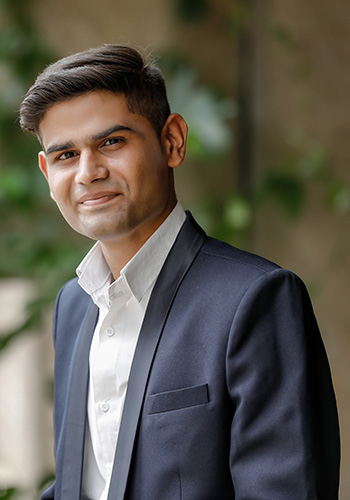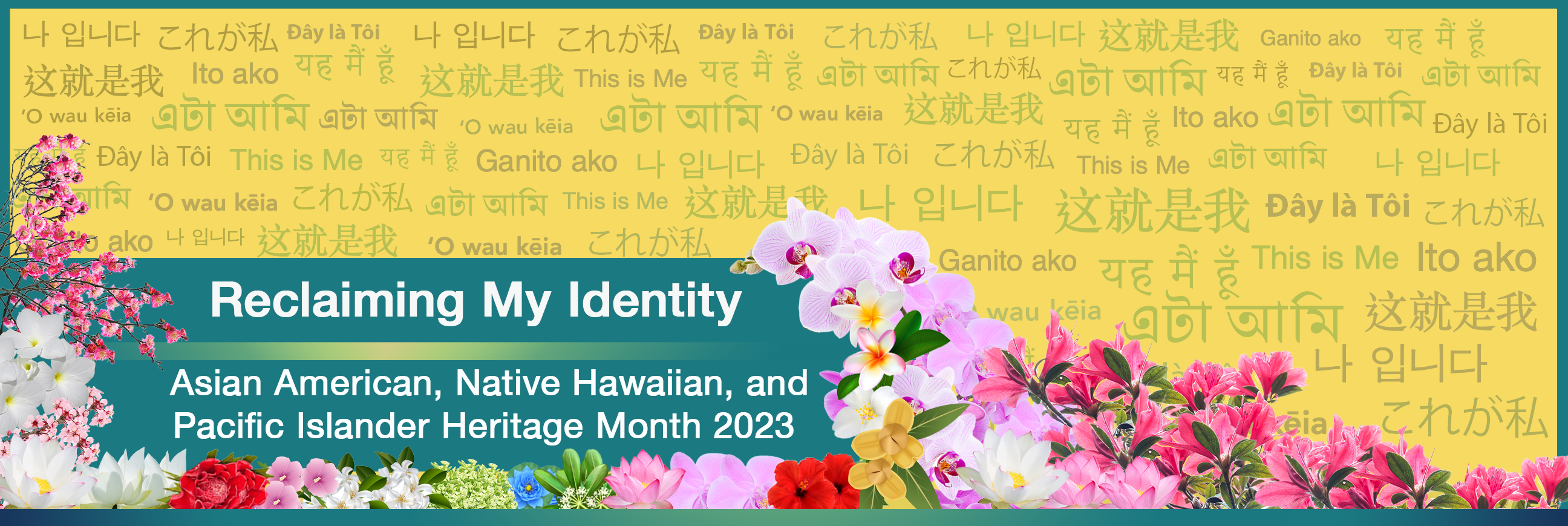
A Message from the Strategist
I am honored to present the Office of Equity, Diversity, and Inclusion’s 2023 Asian American, Native Hawaiian, and Pacific Islander (AA and NHPI) Heritage Month Campaign – “Reclaiming My Identity.” This month, we focus on uplifting our colleagues from the AA and NHPI community by highlighting their contributions and experiences as part of the NIH workforce. While we celebrate the invaluable dedication from this segment of the workforce, we are cognizant that our commitment in addressing the barriers and challenges that AA and NHPIs experience is both on-going and real.
This month, AA and NHPIs, at NIH and beyond, share their knowledge of how they live out success in their own definition. As we grow our legacy and roots as part of NIH’s overall mission, we are empowered to tell our stories, and redefine our future.
Since the beginning of 2021, the White House has pledged to take actionable steps to address the needs of AA and NHPIs by developing and promoting policies focused on equity, opportunity, and justice for our communities. In February 2023, we had the unique occasion to assemble a small team of NIH subject matter experts to speak on matters relevant to health equity. Our audience was the President’s Advisory Commission on AA and NHPI within the White House Initiative on AA and NHPI.
We embrace the rich diversity embodied by our vibrant AA and NHPI community. I am committed to working together with those who are interested in furthering the advancement of diversity, equity, inclusion, and accessibility. There is much to celebrate, and even more to learn from each other. Join me for this year’s AA and NHPI Heritage Month as we continue this journey together.

Caroline Goon
Principal Strategist
AA and NHPI Portfolio
Celebrating NIH AA and NHPI Scientists and Staff
Who is part of our vibrant AA and NHPI community at NIH? Meet five unique NIH staff members through a series of biographies and interviews. In this feature, employees share their personal career journeys and insights.
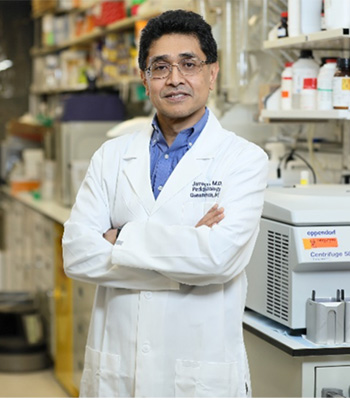
Javed Khan, M.D., is the Deputy Chief of the Genetics Branch, and Senior Investigator of the Oncogenomic Section at the National Cancer Institute’s (NCI) Center for Cancer Research (CCR). Dr. Khan’s lab leverages genomics and bioinformatics, including next-generation sequencing and machine learning tools, to investigate high-risk metastatic, refractory, and recurrent pediatric cancers, specifically neuroblastoma and rhabdomyosarcoma. Additionally, he is a trained pediatric oncologist.
Dr. Khan obtained his bachelor's and master's degrees in pathology, immunology, and parasitology at the University of Cambridge. He subsequently obtained his M.B. Bachelor of Medicine, Bachelor of Surgery (BChir, equivalent to an M.D.), and a postgraduate degree from the Membership of the Royal College of Physicians (equivalent to board certification in the United States). After clinical training in internal medicine and pediatrics as well as other specialties, Dr. Khan received a leukemia research fellowship. In May 2001, Dr. Khan joined the Pediatric Oncology Branch at NCI as a physician-scientist.
What is your ethnic background?
Bangladeshi
What school did you attend?
I earned my bachelor’s and master’s degrees in Pathology, Immunology, and Parasitology from Cambridge University and my BChir from Cambridge University Medical School.
How did you choose your career?
When I was at Cambridge, I studied pathology and immunology, then later obtained my medical degree. My interest in working directly with people, especially children, led me to the decision to pursue pediatric medicine. Following my studies, I was a fellow in a two-year leukemia research fellowship, working in the pediatric oncology department at Addenbrooke’s Hospital in Cambridge.
From my experience in the fellowship, I was able to develop my focus in oncology, specifically genetics and pediatric oncology. My interests later evolved into translational genomics and immunogenomics, which included genome-guided precision therapies and developing adoptive cell therapy such as CAR T-cell therapy. To combine my passion for medicine and research, I ultimately came to NIH because it is one of the premier places that trains physicians in both medicine and science and now I am a physician-scientist.
What kind of work do you do at NIH?
I am the Deputy Chief of the Genetics Branch and head of a lab named the Oncogenomics Section at NCI. I am also a pediatric oncologist by training, and I lead a research team focused on cancer genetics, bioinformatics, and immunotherapy. Our goals are to identify diagnostic and prognostic biomarkers, decipher the biology, and ultimately develop new treatments for pediatric cancers. We have two main disease focuses; sarcomas (rhabdomyosarcoma) and neuroblastomas. I also write protocols for clinical trials based on studies conducted in my lab.
What is your proudest achievement?
I am very thankful for the opportunities I have had throughout my career. I am honored to have been recruited as a tenure track investigator to the Pediatric Oncology Branch, in addition to subsequently becoming tenured and being part of the Genetics Branch of NCI. I have had the privilege of mentoring many trainees who have pursued successful careers in academia and industry.
I am excited to have written numerous publications, especially a paper that used machine learning for the diagnostics of pediatric cancers using gene expression profiling, which launched my career in scientific research. Furthermore, I am proud of my accomplishments in researching rhabdomyosarcoma, a rare form of muscle cancer in children, including discovering and determining how the fusion gene, PAX3-FOXO1, acts as an oncogenic driver in this disease and how it can be targeted. I am excited to be developing clinical trials, including using FGFR4 CAR T-cells for treating rhabdomyosarcoma.
Would you like to acknowledge any mentors, mentees, family, or friends who were valuable resources for your career development? How did they contribute to your success?
There have been numerous individuals that were pivotal in my career journey. During my fellowship at Addenbrooke’s Hospital in Cambridge, Dr. Valerie Broadbent, a pediatric oncologist, instilled my interest in oncology. I would also like to thank Dr. Jeffrey Trent, the National Human Genome Research Institute's founding Scientific Director, and Dr. Paul Meltzer, Chief of the Genetics Branch in CCR of NCI, who both mentored me in the fields of genetics and genomics while I was a fellow at NIH. Additionally, I would like to thank Dr. Lee Helman who trained me in pediatric oncology research, as well as Dr. Ed Liu and other CCR Directors who hired and supported me in the role of a principal investigator.
During my time at NIH, I have had the privilege to work with so many bright, talented trainees, that it is hard to name them all. Many of my mentees have now become tenured, tenure-track investigators, or physicians, or are pursuing careers in academia or industry. I am so thankful to have worked with all of them as they helped me to become a better scientist and mentor.
Lastly, I would like to thank my wife who gave me constant support throughout my career. I would not have gotten to where I am today without her.
What advice would you share with aspiring AA and NHPI future leaders?
Love and enjoy your work. NIH is a place to grow and think big and do high-risk, high-reward research. Make good use of the many resources available at NIH, whether that be people with a wide range of expertise, the outstanding core facilities, or the first-class Clinical Center. Furthermore, mentor and nurture the next generation of scientists and leaders.
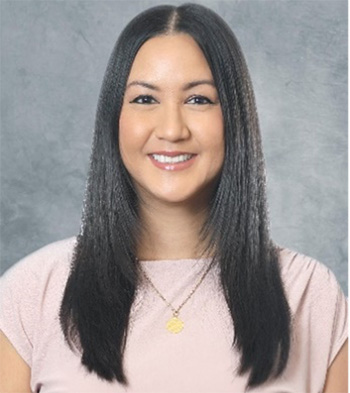
Phalla K. Messina, B.S., is a class of 2023 Management Intern (MI). Before the MI program, Phalla was a Public Affairs Specialist at the National Institute on Deafness and Other Communication Disorders (NIDCD). At NIDCD, Phalla led a national public education campaign, community outreach, and the institute's social media platforms. In addition, she developed content for fact sheets, e-newsletters, and internal and public websites.
Since joining the MI program in 2021, Phalla has completed rotations at several institutes and offices with a focus on budget (National Institute of Dental and Craniofacial Research), management analysis (National Institute of General Medical Sciences, Office of Human Resources, and the National Institute on Aging), program analysis (National Cancer Institute), and has also gained experience as a Program Specialist/Equal Employment Opportunity Specialist (Office of Equity, Diversity, and Inclusion). She is currently serving as the Executive Secretary for the Deputy Executive Officer Roundtable.
What is your ethnic background?
Cambodian American
What school did you attend?
I earned a B.S. in Behavioral and Community Health from the University of Maryland (UMD), College Park.
How did you choose your career?
I am passionate about health, wellness, and public service. During my time at the UMD School of Public Health, I had the opportunity to intern through the NIH’s student career experience program and transitioned to a full-time employee after graduation. My interest in public health made NIH the perfect place to begin my federal career.
What kind of work do you do at the NIH?
Before I was accepted into the MI program in 2021, I was a Public Affairs Specialist at a health communication and public liaison office. The MI program is a highly competitive two-year program that offers key resources, targeted training, and hands-on experience in management and administration. I have had the opportunity to diversify my administrative skillset through several rotations at various institutes and offices.
What is your proudest achievement?
My family is Cambodian and immigrated to the U.S. as refugees. With support from my family, friends, UMD’s Academic Achievement Programs, and the local community in Prince George's County, Maryland, I am immensely proud to be a first-generation college graduate and professional. In my role as a Public Affairs Specialist, I had the opportunity to lead a national public education campaign, It's a Noisy Planet. Protect Their Hearing.® The campaign educates kids about the importance of preventing noise-induced hearing loss through an interactive classroom presentation, community events, and educational materials. During my time in that role, I conducted hundreds of presentations, and the campaign expanded to over 20,000 kids in the Washington D.C. metro area. Most recently, I am proud of being selected for the 2023 NIH MI program cohort. My time as an MI has been transformative.
Would you like to acknowledge any mentors, mentees, family, or friends who were valuable resources for your career development? How did they contribute to your success?
I have had several mentors whom all played a critical role in my career development. In particular, graduates of the MI program and other NIH leaders have all been vital to my professional development for the past two years. My colleagues contributed to my success by taking the time to learn about my goals, and by sharing their diverse perspectives, advice, and encouragement with me. I am grateful for their time and commitment to mentoring me.
What advice would you share with aspiring AA and NHPI and/or leaders?
My advice is to step into your power by recognizing the value you bring to the organization, embrace change and transformation, and build a supportive network of mentors. It is also important to get comfortable with being uncomfortable because it can be reframed as an opportunity for growth. If you feel uncomfortable with networking because you are new to it, try to reframe your situation and think of it as an opportunity to build relationships, and learn what types of options could be available to you. Be proactive and get involved, get to know people, and they will get to know you. Seek mentors who are willing to help you navigate your career. There are many resources such as NIH-wide committees, professional development training, employee resource groups, and mentorship programs. Always be curious, listen and learn from others, have a growth mindset, and give back. Advocate for yourself and others. Learn during your time as a mentee, become a peer mentor when possible, and give back by mentoring the next generation when you have gained enough experience to offer your expertise.
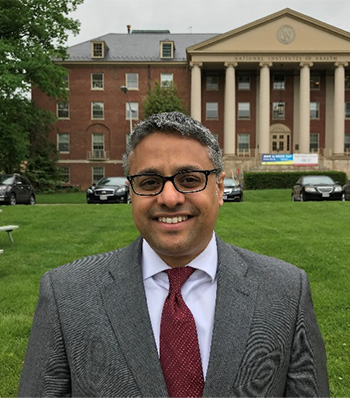
Sandeep Dayal, Ph.D., is the Chief of the Science Policy, Outreach, and Reporting Branch at the National Heart, Lung, and Blood Institute (NHLBI). Dr. Dayal leads a team with a range of policy-related responsibilities, such as engaging with policymakers and NHLBI stakeholders; liaising with Congress; developing technical reports on institute activities; responding to scientifically complex inquiries and data calls; and much more. Before NHLBI, Dr. Dayal spent more than a decade in the Office of Scientific Program and Policy Analysis at the National Institute of Diabetes and Digestive and Kidney Diseases (NIDDK).
Before his career transition to science policy, Dr. Dayal spent many years as a laboratory scientist. He received his doctoral degree in biochemistry and molecular biology from the University of Texas MD Anderson Cancer Center and Health Sciences Center in Houston, where he investigated the evolution of embryonic gene regulatory mechanisms using sea urchins as a model system. He then joined NIDDK's Laboratory of Molecular Biology as a postdoctoral fellow, researching chromatin remodeling associated with DNA recombination events.
What is your nationality?
Indian
What school did you attend?
I hold a B.S. in Cell and Molecular Biology from California State University at Northridge, and an M.S. in Cell and Molecular Biology from Eastern Michigan University. I also earned my Ph.D. in Biochemistry and Molecular Biology from the University of Texas MD Anderson Cancer Center and Health Sciences Center in Houston.
How did you choose your career?
In college, I was on the pre-medicine track but ultimately decided that it was not the career path for me. I enjoyed the scientific elements I was learning but it was not an area I spent enough time exploring. As a result, I pursued a master’s degree and was able to obtain research experience that led me to discover the field of developmental biology. From there, I attended the MD Anderson Cancer Center for my Ph.D. with the intent of going into academia and becoming a professor. While I was in my doctorate program, I was highly involved in the student body, such as being the president of the graduate student association and volunteering at local schools in underserved communities to promote science education. After receiving my Ph.D., I came to NIH as a post-doctoral fellow, but early into my fellowship, I realized that academic science was not my desired career path.
During my fellowship, I was involved in the NIH Fellows Committee, where I was able to explore career options and engage in leadership activities, which allowed me to gain experience outside of the lab. Meanwhile, I did a lot of self-reflection on my interests, as well as my strengths and weaknesses, and concluded that science policy was a great fit for me. I have always thought very broadly about science; believed I was a good writer and communicator; and was intrigued by the intersection of politics, policy, and science. Through many informational interviews, exploration of science policy work, and my formative experiences, I was able to transition to science policy work at NIH.
What kind of work do you do at NIH?
I am the Chief of NHLBI’s Science Policy Outreach and Reporting Branch. Our team serves as the focal point for all NHLBI’s congressional engagements. We also engage with relevant stakeholders and serve as the point of coordination for many reporting needs that require clear and accurate communication of research supported by NHLBI. We often receive congressional inquiries that need immediate responses and collaborate with subject matter experts to communicate complex scientific information using lay language. We also prepare leadership for congressional briefings, write testimonies, and prepare materials for the NHLBI Director when they go before Congress.
What is your proudest achievement?
I am so proud of the range of work that I have done with my colleagues at NIH, but I will mention one example from early in my career. Shortly after I joined NIDDK’s Office of Scientific Program and Policy Analysis, I was allowed to lead the project developing NIDDK’s annual report, an enormous logistical undertaking. This report is a tool to deliver our messages to Congress and other stakeholders, such as informing the public and policymakers about the value of the research and work supported by taxpayers. Some of the most important components of the report included scientific advances that are supported by NIDDK. The report also included interviews with patients and study participants in clinical trials to share personal stories, bring awareness, and emphasize the importance of participating in studies.
In addition, the report highlights new initiatives and future goals for the institute. The annual report was a critical responsibility of the office when I was at NIDDK, as well as one of the biggest projects I had been assigned at that point in my science policy career. From this report, I was able to gain and hone skills in project management, coordinate with people across the institute, and develop other administrative skills that contribute to my career success today.
Would you like to acknowledge any mentors, mentees, family, or friends who were valuable resources for your career development? How did they contribute to your success?
I have had many mentors who taught and guided me over the years, but I will name just a few that I would like to acknowledge. From my graduate school days, I thank Dr. Robert Winning at Eastern Michigan University and Dr. William Klein at MD Anderson Cancer Center, developmental biologists who trained me and helped shape my academic interests in science. During my time as a post-doctoral fellow at NIH, I had the great fortune of working with Dr. Martin Gellert and Dr. Gary Felsenfeld, both of whom taught me how to think rigorously about science and the scientific process, and who were role models of exceptional leadership. Their actions shaped my views of what it means to be a kind, thoughtful, and compassionate leader.
Additionally, I would like to acknowledge Dr. Lisa Gansheroff, Deputy Director of NIDDK’s Office of Scientific Program and Policy Analysis. When I transitioned from lab work to science policy, she taught me, a bench scientist, how to be an effective science policy professional. Dr. Gansheroff helped me understand the landscape of policy issues that are relevant to us, develop project management skills, and sharpen my ability to communicate with others clearly and deliberately. Lastly, I want to acknowledge my father, an academic professor, and administrator, who instilled in me a thirst for academia and knowledge.
What advice would you share with aspiring AA and NHPI future leaders?
I have two pieces of advice: Believe in yourself and network. There will always be times in life when you will doubt yourself. At a premier institution with so many brilliant minds like NIH, keep reminding yourself that you are meant to be here. People who have come before you have all experienced this feeling of self-doubt, and in some cases not belonging. When you are in this moment of self-doubt, take a step back and remember all you have done to get to this point. Just believe in yourself.
I always encourage people to network and talk to everyone and anyone, especially in career fields and positions that they are interested in. Often, people are very willing to pay it forward, such as by giving advice and offering new perspectives. Building my network has helped me tremendously throughout my career, especially as I transitioned from lab work and research to science policy.
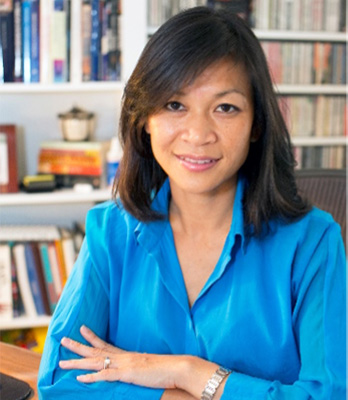
Tram Kim Lam, Ph.D., is Chief of the Environmental Epidemiology Branch of the Epidemiology and Genomics Research Program in the National Cancer Institute’s (NCI) Division of Cancer Control and Population Sciences (DCCPS). Dr. Lam leads a group of Program Directors who have expertise spanning all domains of the exposome, including lifestyle factors; environmental pollutants; biomarkers of effect; early damage; broader social context; and chemical, physical, and infectious agents. She also oversees a research grant portfolio that focuses on modifiable factors (e.g., infectious agents, environmental exposures, genomics, and lifestyles); the interplay between determinants of cancer; and how they influence susceptibility to cancer nationally and globally. During her career, Dr. Lam's research interests crossed disciplines and included epidemiologic studies on genetic and lifestyle factors associated with cancers; international collaboration on HIV/AIDS intervention in Southeast Asia and East Africa; and community-participatory research and health promotion to reduce cervical cancer incidence in underserved populations.
What is your ethnic background?
Vietnamese
What school did you attend?
I received my B.S. in Biology from Yale University, and an M.P.H., and Ph.D. in Epidemiology from Johns Hopkins Bloomberg School of Public Health.
How did you choose your career?
I spent a year after college on a fellowship in Vietnam during the HIV/AIDS epidemic in Asia. This experience initiated my appreciation for epidemiology and public health and the impact those fields can have on health at a population level. We witnessed how critical epidemiology and public health would be during the COVID pandemic.
Several years after my fellowship in Vietnam, I contributed to a community-based effort to promote cervical cancer screening in Vietnamese-American women using a multi-level approach. This approach included community engagement and targeted interventions to reduce the burden of cervical cancer in the Vietnamese-American population who at that time had a three times higher risk of cervical cancer than non-Hispanic white women. These experiences inspired me to pursue a doctoral degree in cancer epidemiology at Johns Hopkins and a postdoctoral cancer prevention fellowship at NCI.
I believe in NCI’s vision and mission since cancer has touched my life personally and impacted many others. At DCCPS, we support this vision and mission by stimulating and supporting population sciences research that can inform, and cancer control and prevention strategies. My appreciation for epidemiology has only grown deeper. I appreciate the discipline, and the underlying science, and how that science can be leveraged to alter the trajectory of people’s lives and health at a population level. It is important to continue population-based research in cancer control and public health.
What kind of work do you do at NIH?
I am the Chief of the Environmental Epidemiology Branch of the Epidemiology and Genomics Research Program in the Extramural DCCPS at NCI. Our branch stimulates and supports epidemiologic research on environmental and modifiable risk factors and cancer in diverse populations. By understanding how these factors contribute to cancer incidence, by using cancer epidemiology study designs, we can develop informed prevention and intervention strategies and help lessen the burden of cancer for all. I have led several trans-NCI efforts and scientific initiatives, such as the Metabolic Dysregulation and Cancer Risk Program and the Epidemiologic Research on Emerging Risk Factors and Liver Cancer Susceptibility.
What is your proudest achievement?
Rather than identifying a proud achievement, I am continuously striving to contribute to a greater mission than myself and doing what I can to leave a better place for my children and the next generation. I am deeply passionate about the work that I do. I have a specific interest in addressing the inequities in cancer research and burden. For example, I work on scientific initiatives that seek to advance to our understanding of factors and exposures that are more common in some groups, which in turn may contribute to greater cancer burden in those understudied populations. I strive to participate in the collective effort across NIH to promote equity and representation for all populations. Our work is continuously evolving, and there is still a lot of work to be done.
Would you like to acknowledge any mentors, mentees, family, or friends who were valuable resources for your career development? How did they contribute to your success?
My parents gave me everything that led to my career today. My family were "boat people," refugees who fled Vietnam by boat and ship after the end of the Vietnam War. We stayed at a refugee camp for three years before immigrating to the United States when I was 10 years old. Without their vision and sacrifices to get our family out of Vietnam, and their hard work and resilience despite their circumstances, I would not be here today. My parents not only gave me life, but they also gave me a second chance at life. The desire to give their children a better future than they had continues to motivate me to share a lasting impact on the world.
Additionally, I would like to thank every teacher and mentor who invested in and saw my potential as an Asian girl with an accent. I genuinely believe we owe the world a debt to teachers and those who care to raise the generations to come.
What advice would you share with aspiring AA and NHPI future leaders?
Do not be afraid to let your voice be heard, speak your truth, and augment the voice of others who may not have an opportunity to do so. Be curious and be a leader for all. There is a Vietnamese fable where a king showed his sons how easily singular chopsticks can be broken but once you bundle the sticks together, they become difficult to break. Just like the bundled chopsticks, we are stronger and better together.
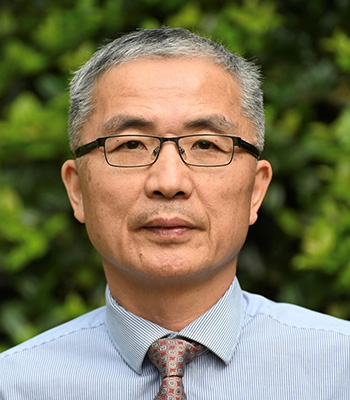
Yuling Hong, Ph.D., is the Chief of the Epidemiology Branch, Division of Cardiovascular Sciences (DCVS), at the National Heart, Lung, and Blood Institute (NHLBI). Before joining NHLBI in July 2020, Dr. Hong was the Associate Director for Science in the Division for Heart Disease and Stroke Prevention at the Center for Disease Control, Director of the American Heart Association Statistics and Epidemiology Unit, and a faculty member at Washington University School of Medicine in St. Louis. His areas of expertise include cardiovascular epidemiology and prevention, genetic epidemiology, and evidence-based guideline development. Dr. Hong received his Ph.D. in Cardiovascular and Genetic Epidemiology from Karolinska Institutet, Stockholm, Sweden; an M.S. in Epidemiology from Erasmus University, Rotterdam, Netherlands; and a Bachelor of Medicine (equivalent to an M.D. in the U.S.) from Shanghai Medical University, China.
What is your ethnic background?
Chinese
What school did you attend?
I attended Shanghai Medical College of Fudan University for my Bachelor of Medicine; Erasmus University, Rotterdam for my M.S. in Epidemiology; and Karolinska Institutet for my Ph.D. in Cardiovascular and Genetic Epidemiology.
How did you choose your career?
In China at the time, we were limited in information and resources when choosing a career. Medicine was not my first choice, but I was interested in science and engineering. However, the persuasion of my high school teachers encouraged me to pursue medicine when applying to universities.
What kind of work do you do at NIH?
I am the Chief of the Epidemiology Branch in DCVS at NHLBI in the Extramural Program managing grants, cooperative agreements, and contracts in addition to developing new research initiatives. We also support a dozen large population-based cohort studies.
What is your proudest achievement?
My proudest achievement is creating the initiative for a new epidemiological cohort study of Asian Americans, Native Hawaiians, and Pacific Islanders (AA and NHPI). AA and NHPI are highly diverse linguistically, culturally, and demographically. However, these groups are aggregated, masking health disparities in specific groups, in most national surveys, reports, and studies.
This epidemiological cohort study will enable the enrollment, initial examination, and follow-up activities of a cohort of approximately 10,000 participants from multiple immigrant generations of ancestral AA and NHPI subpopulations. Specifically, this initiative will utilize a populomics perspective, i.e., examination of health influences across multiple levels (biological, lifestyle/behavioral, environmental, and sociocultural) using multi-disciplinary methods. The purpose of this approach is to innovatively investigate the web of influences impacting the health of AA and NHPI and to understand mechanisms of disease with appropriate data disaggregation across AA and NHPI subpopulations.
Would you like to acknowledge any mentors, mentees, family, or friends who were valuable resources for your career development? How did they contribute to your success?
All my mentors throughout my professional career have been incredibly supportive. Upon graduation from Shanghai Medical College of Fudan University, I was able to join the teaching hospital adjacent to the college. My mentors, Dr. Leng Jiang and the late Dr. Haozhu Chen were able to support my study and training abroad in pursuit of my graduate degrees.
Furthermore, while I was at Erasmus University, Rotterdam, and Karolinska Institutet, I was able to publish five papers with the guidance of my professors, Drs. Albert Hofman, Nancy Pedersen, and Ulf de Faire. Additionally, I am grateful to Dr. D.C. Rao for granting me the opportunity to publish nearly two dozen journal articles within four years when I was at Washington University in St. Louis, my first post-graduate academic affiliation. The articles relied upon knowledge from research investigators across several multicenter studies.
What advice would you share with aspiring AA and NHPI future leaders?
Be open-minded and actively seek advice from your colleagues and mentors. All kinds of experiences are important and will help broaden your perspective in your work, so take advantage of any opportunity. Work with different kinds of people of various backgrounds and learn from each other.
Events
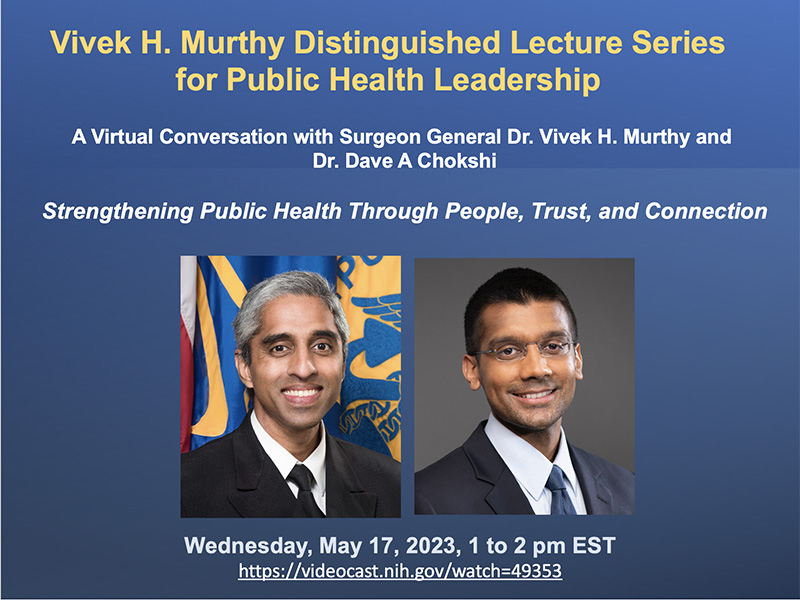
Vivek H. Murthy Distinguished Lecture Series for Public Health Leadership: A Virtual Conversation with Surgeon General Dr. Vivek H. Murthy and Dr. Dave A Chokshi
Wednesday, May 17, 2023 | 1:00 pm to 2:00 pm EDT
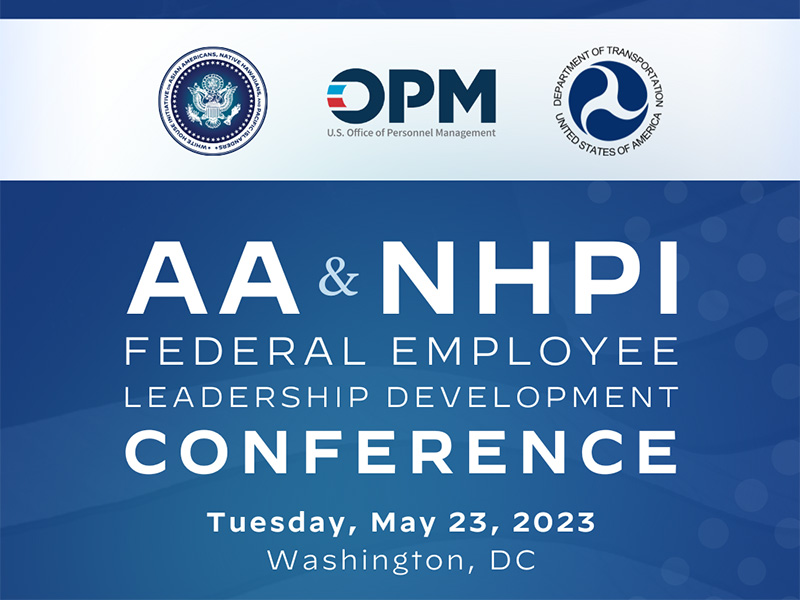
2023 AA and NHPI
Federal Employee Leadership Development Conference
Tuesday, May 23, 2023 | 9:30 am to 5:00 pm EDT
Reclaiming My Identity
This year’s AA and NHPI Heritage Month theme is, “Reclaiming My Identity.” The theme was inspired by, and is an expansion of, the Washington Post article entitled, “The Power of Reclaiming My Asian Name.” In the article, the author explores the significance of her name, and how using it along with her Anglicized name allowed her to embrace her complete identity as an Asian American. Shared below are the personal experiences of a few of your colleagues at the NIH in their journey of reclaiming their identity. These stories are important to share because they let us know that we are not alone in our struggles and challenges. These intimate stories can begin to convey the complexity and richness of the AA and NHPI experience in the United States. Through our stories we can be reminded of the beauty of celebrating and embracing diversity in a pluralistic society. Perhaps these stories can also cross boundaries to reflect human experiences that we all go through and connect us in solidarity.
Featured Blogs
About the Artwork
The artwork that leads our 2023 Asian American, Native Hawaiian, and Pacific Islander (AA and NHPI) observance features the phrase “This is Me” translated in Korean, Hindi, Bengali, Tagalog, Japanese, Chinese, Vietnamese, and Native Hawaiian. Seven out of eight of those languages are spoken by the largest Asian American ethnic groups. The artwork also displays the national flowers of over 20 Asian and Pacific Island countries to celebrate the beauty and individuality of the rich cultures within the AA and NHPI community.





